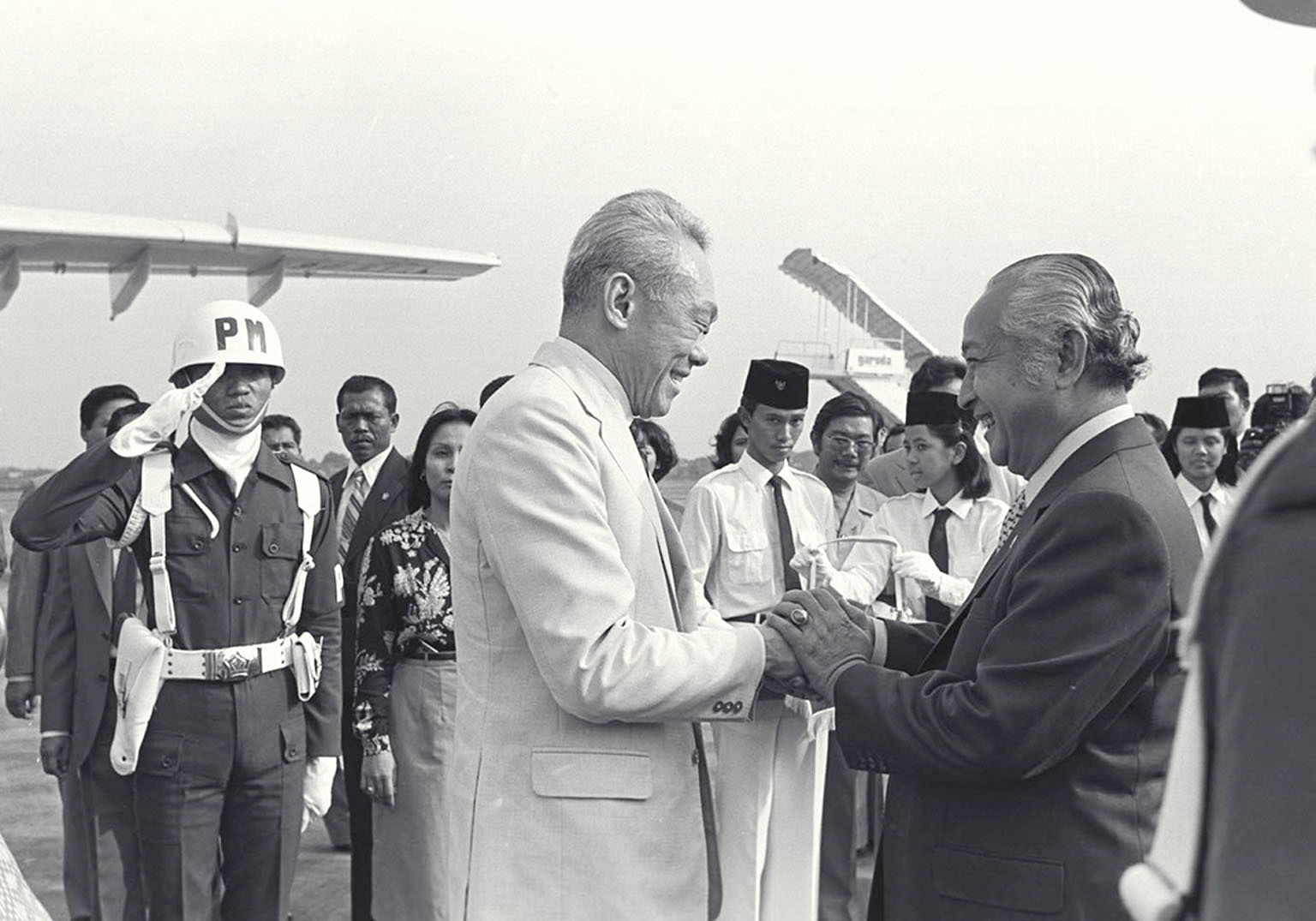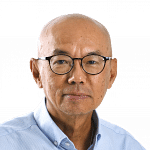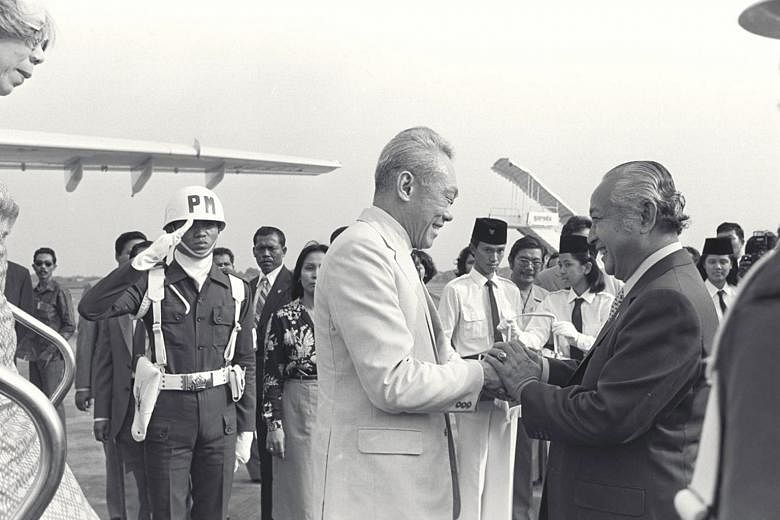The world is being disrupted but not by the usual suspects.
Globalisation? Technology? They have had their moments causing people to lose jobs, politicians to lose elections and traditional businesses to lose customers.
However, the biggest disrupters in recent times have not been any of the above, but political leaders driven by their own visions to change their societies and the world around them. Looking at the disruptions caused so far, they have been spectacularly successful.
Topping the list are leaders of the two most powerful countries in the world with ambitions to match - Chinese President Xi Jinping and American President Donald Trump.
President Xi has just concluded what was touted as China's biggest diplomatic event of the year - the Belt and Road Initiative (BRI) summit attended by 29 heads of government gathered in Beijing to celebrate his vision of recreating the old Silk and Maritime routes of the Middle Kingdom.
China hasn't seen such a strongman leader since Deng Xiaopeng.
Whereas Deng focused on the country's economic development, President Xi has moved boldly to expand China's economic and political space abroad. He has succeeded in positioning China as the champion of globalisation and free trade, capitalising on President Trump's inward-looking America-first policy. Under his leadership, China's influence is causing seismic shifts in the geopolitical landscape, particularly in East and South-east Asia.
He has met his match in Mr Trump? The American President is a different kind of disrupter. He wants to reshape US thinking at home and abroad. But because he faces mounting problems running the government in Washington, with the sacking of the FBI director and allegations of Russian involvement in the presidential election adding to the disarray, it is unclear if he can conduct US foreign policy in a coherent way.

A rudderless America can cause massive disruptions in a world with so many challenges. It is still too early to tell but the uncertainty is disruptive enough.
Then there are disrupters like Japanese Prime Minister Shinzo Abe, who wants to change his country's pacifist Constitution; North Korean President Kim Jong Un and his nuclear brinkmanship; and the straight-talking Philippines President Rodrigo Duterte, who single-handedly altered his country's foreign policy tilt towards China.
The combined effect of the ambitions and actions of these political actors is a more uncertain and unpredictable world. They may bring tremendous benefits in the process, such as China's BRI, but there can be no doubt that the status quo will be disrupted.
How does a small country like Singapore navigate its way amid these changes? Many Singaporeans worry over this. To them, the international horizon has darkened considerably in recent months, especially over China-Singapore ties, which appear to have touched a new low with the non-invitation of Prime Minister Lee Hsien Loong to the BRI summit in Beijing.
If there is any consolation, Singapore has been here before. In fact, at independence in 1965, the outside world appeared even more hostile. To the north, its relationship with Malaysia was still toxic after the trauma of separation. To the south, Indonesia had not ended its Konfrontasi attacks against Malaysia. In 1968, the Singapore Embassy and the ambassador's residence in Jakarta were attacked and sacked by a mob of 400 uniformed students after Singapore refused Indonesian pleas not to execute two saboteurs who had bombed MacDonald House in Orchard Road, killing three people.
The Vietnam War was raging, threatening to spread unrest to other South-east Asian countries. China was in the throes of a cultural revolution to reassert Maoist teachings, causing great upheaval and suffering to millions of people. The Cold War between the US and the Soviet Union and their nuclear arms race put the world in danger of total destruction.
Looking back now at those troubled times, it is a wonder that peace and prosperity reigned for so many years, enabling Singapore to progress rapidly. Even more surprisingly, one of its notable successes has been in foreign policy - maintaining friendly ties with almost every country and playing an outsized role in international organisations, including Asean. Singapore was also seen as a valued interlocutor between East and West.
What accounts for this success and what lesson can be drawn to help Singapore going forward?
Much of the credit goes to founding leaders like Lee Kuan Yew, S. Rajaratnam and Goh Keng Swee, who understood the realities facing a small city state struggling to find its place in the world.
In his book, One Man's View Of The World, Mr Lee put it this way: "Singapore has to take the world as it is; it is too small to change it. But we can try to maximise the space we have to manoeuvre among the big 'trees' in the region. That has been our approach and we will have to be nimble and resourceful to be able to continue doing so."
This pragmatic foreign policy served Singapore well. But it is only a start because you need to execute it successfully, in different situations involving different countries. How did Singapore do it?
I am sure there are many foreign policy experts, including Singapore diplomats, who can provide answers. But, for me, there are three lessons from the past.
First is the importance of building personal relationships with leaders who matter to Singapore's future. The best example was Mr Lee's friendship with Indonesian President Suharto, which was all the more remarkable because they had the worst possible start when Singapore hanged the two bombers. But, over time, the relationship blossomed.
This was what Mr Lee said in his memoirs: "It was our good fortune that the character, temperament and objectives of President Suharto allowed me to develop good personal relations with him… Our friendship overcame the many prejudices between Singaporeans of Chinese descent and Indonesians. Throughout the 1970s and 80s, we met almost every year to keep in touch, exchange views and discuss matters that cropped up."
It could have turned out very differently because the two men were such different characters but they worked at the relationship to the great benefit of their two countries. Mr Lee was also able to build personal ties with Asian, American and European leaders.
The second lesson is the importance of moving fast when an opportunity presents itself. Foreign policy is usually carefully thought out and measured, but events can happen quickly and when they do, you need to be fleet-footed to respond to them.
One example: When the Philippines under Mrs Corazon Aquino kicked the American military out of their bases in 1989, Singapore moved to allow its facilities here to be used by the US. There were initial reservations from Malaysia and Indonesia but, over time, they came round to Singapore's position that a US presence in the region was good for peace and stability.
If Singapore had not reacted the way it did, who knows what might have happened subsequently.
The international landscape is changing even more rapidly today, with China's rise and the disruptions created by various political actors. Singapore will need to respond nimbly, sometimes quickly, to threats and opportunities when they arise.
Third, throughout the early years when Singapore struggled to establish itself, its leaders were not afraid to speak openly about its problems. Mr Lee made many speeches about the difficulties with Malaysia, and Mr Rajaratnam was known for the colourful and forceful way he spoke about international issues. They did not sugarcoat their comments to shield the people from the harsh realities of international diplomacy.
Singaporeans benefitted from the honesty and gained a better understanding of the world around them. It helped, too, in building trust between the leaders and the people, that they were in it together, especially during difficult times.
I hope these lessons from the past will not be forgotten.
- The writer is also a senior fellow at the S. Rajaratnam School of International Studies, Nanyang Technological University


